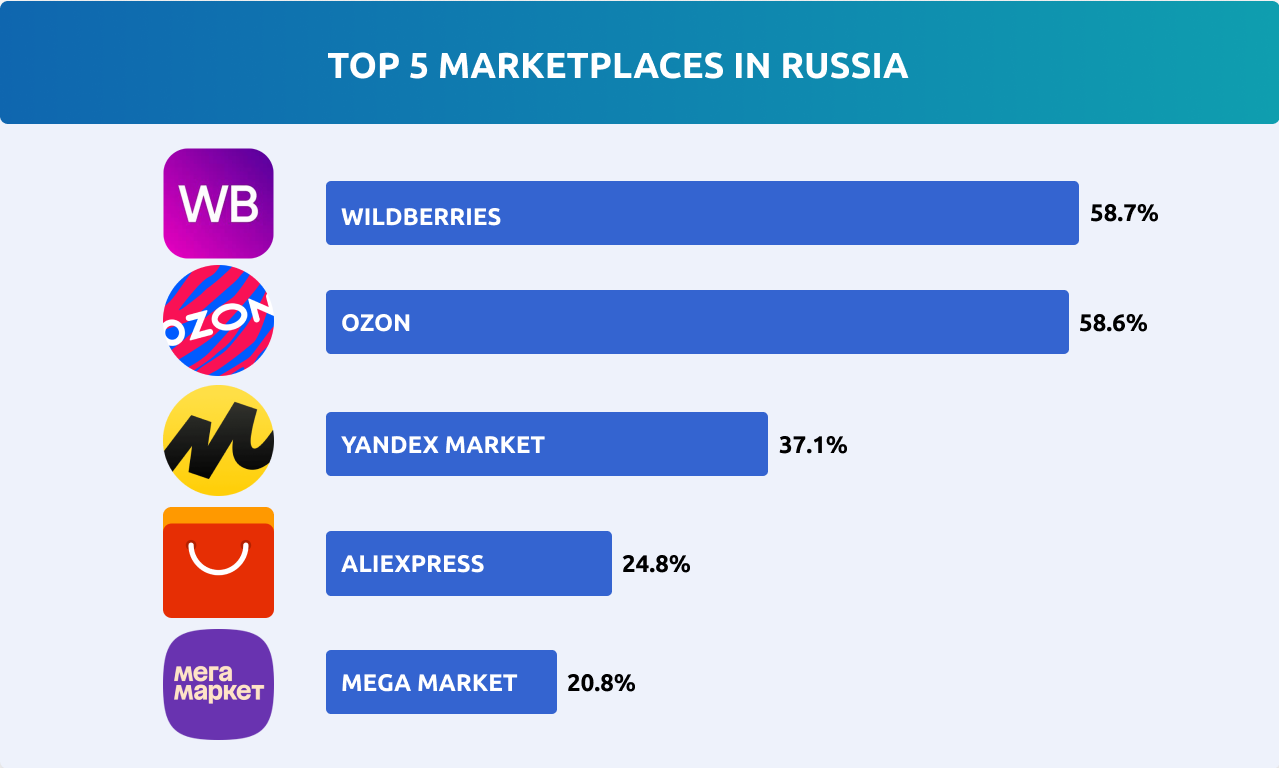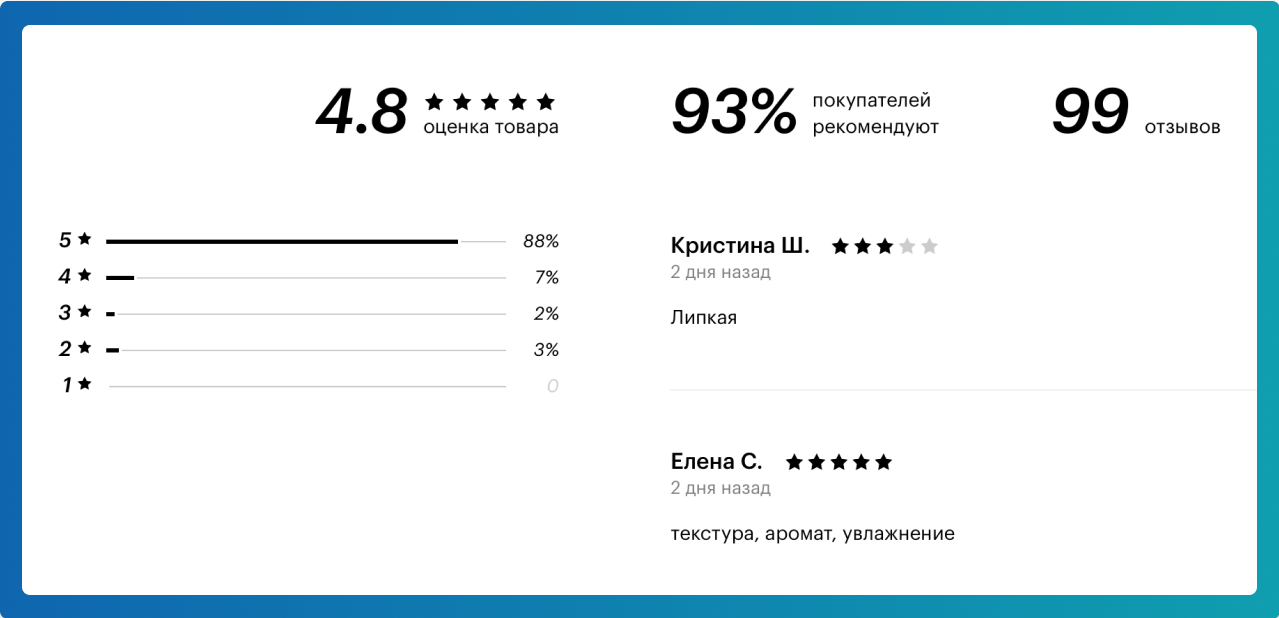Blog about successful marketing strategies in russia
SERM and ORM in the Russian Internet: A Comprehensive Guide


DIGITAL MARKETING
Share this Post
In the current digital landscape, brand reputation has become a crucial determinant of business success, particularly for those operating remotely. A positive opinion builds trust. Negative content, on the contrary, can and will damage a company. This is why working with an online reputation requires a systematic, comprehensive approach and constant updating of its tools.
Two main directions in working with digital reputation are Search Engine Reputation Management (SERM) and Online Reputation Management (ORM). SERM is only one element of ORM, which focuses on search engine rankings. The main task of ORM is to build a positive perception of the brand at all levels of online presence. Let's take a closer look.
Brand reputation in search engines
Search Engine Reputation Management (SERM) is a strategy for managing brand image through search engine results. The main goal of SERM is to improve the visibility of positive content and eliminate negative one from search results.
Yandex and Google are the most popular search engines in Russia. Although for official search promotion, Yandex only remains. Also, no one has canceled the effectiveness of SEO site to work in Google, because as of July 2024, 31.93% of Russian users still use this system.
Work with brand’s SERM is based on several main tasks:
-
Publishing positive news, interviews, case studies, and other brand-related materials on authoritative resources.
-
Optimization of the created content for search engines, work with keywords, meta tags, and interlinking.
-
Placing links to positive materials on other reputable sites to increase their authority and position in search engine results.
-
Replacing negative content about the brand (if any) with positive materials.

Yandex search results for the query ‘Farm Stay Korean cosmetics’ containing positive reviews about the product on marketplaces
It is crucial to understand that all of these tasks will be solved at the lower levels of the marketing funnel, that is, with users who are already interested in the company's products or services.
SERM is vital for all brands, even if they already have a positive image. There is always the risk that another competing brand in the segment may try to damage the brand's reputation. However, there are also companies that need SERM in the first place. For example, these are market newcomers or brands launching a new product. These are companies that have made the decision to do a complete rebranding. Furthermore, they are businesses that have experienced a significant decline in demand. Brands at the tipping point of the information war with competitors will undoubtedly require SERM. In other words, if you want to win over customers who aren't yet loyal to your brand, you need to make SERM a core part of your marketing strategy.
However, it should be noted that working with ratings and reviews is not limited to search queries. It is an essential element in building a company's reputation online.
Geoservices impact on SERMs
When a buyer enters a company or product name into the search box, they will see information about the company and its rating based on reviews left on the site. Many people search for goods and services directly on Yandex or Google Navigator and choose a company based on reviews. Therefore, if a brand in Russia has an actual address and provides offline sales or services, it is essential to use geo services for promotion.
The key advantage of geo services is their ability to connect businesses with potential customers. A user who knows what they want to buy will read reviews on review sites. Maps, on the other hand, are an excellent way to attract a completely new audience that is not yet familiar with the brand. For example, when you type "Buy air conditioner" into Yandex.Maps, you see any nearby household appliance stores, including ones you've never considered before.
Furthermore, search engines rank sites based on information from map services. Yandex and Google prioritize companies that complete their information (including on maps), have a sufficient number of reviews, and have a high rating. You can get on the first page of search results even with a poor SEO setup.
SERM and geo-services are inextricably linked. The right strategy can significantly increase a brand's reputation on the Internet. This is just the beginning.
Global Brand Reputation Management on the Internet
Online Reputation Management (ORM) is the comprehensive term for all aspects of online brand reputation management. ORM is not just about search engine optimization (like SERM). It also includes monitoring and managing brand mentions across all digital platforms, including social media, forums, website reviews, and other channels.
What is the best way to work with ORM?
-
Use special services to track brand mentions on the Internet (e.g., Medialogy, Brand Analytics). Regularly analyze the tone of comments and reviews to understand the current state of reputation.
-
Create and promote positive content (articles, videos, social media posts) on all available platforms.
-
Deal with negative reviews and comments promptly.
-
Engage with your audience. Answer their questions, participate in discussions, and maintain an open and positive dialogue.
Important points of brand reputation management on the Internet
Brand reputation on marketplaces
In 2023, 56% of purchases in Russia were made online while the remaining 44% were offline. The vast majority of shoppers prefer to make their purchases online on marketplaces. They account for 81% of all online orders. Furthermore, buyers are abandoning direct sales channels in favor of marketplaces. The reason is simple: more attractive prices, installment plans, and convenient logistics. This is why brand reputation on marketplaces is one of the most important ORM tasks.
In Russia, there are only five popular marketplaces where goods can be presented. Wildberries is the clear market leader with over 343 million monthly visitors and sales exceeding 2.5 trillion rubles in 2023. Ozon is also experiencing significant growth. In the first three months of 2024, it increased its total merchandise turnover (GMV) by 88%, reaching a size of 570 billion rubles. Ozon is investing in infrastructure and logistics development to expand its influence in the regions and beyond. The number of active buyers in 2023 increased by 43% from 37 to 49 million people.
The major marketplace Yandex.Market is demonstrating similar dynamics. The report for the first quarter of 2024 confirms that the number of active buyers of the service increased by 22%. This also confirms the growing popularity of the platform among Russian consumers.
Read more about marketplaces in our article The Landscape of Russian Online Shopping: Decoding Consumer Behavior.

Let's get back to ORM. The main criteria for brand reputation will be customer ratings and reviews. The figures speak for themselves.
Buyers on marketplaces want to see product reviews. In fact, 46% of them consider this to be especially important when it comes to new brands. This is because they are more concerned with the quality of a product than the price. The audience most often focuses on reviews (35%) and recommendations from friends (30%), so it is crucial for sellers to have positive reviews and high ratings to attract customers. This is relevant for both established on-market brands with large repurchases and new brands. The difference will be in the approach to work.
In the first case, we work with ORM to quickly provide feedback to users who bought the goods and eliminate negative feedback, improving the quality of service.
New brands entering the Russian market through a marketplace must focus on building sales, ratings, and feedback. The following tools are effective for this purpose:
-
Redemption of goods. It is a process that a seller uses to buy their own goods in a marketplace. This increases sales, improves ranking, and strengthens the seller's position in search engines. Redemption can be a massive process that can be completed in the shortest possible time. It can be gradual and combined with advertising and work with reviews. Buybacks are an effective way to increase a product's visibility and sales. However, the effectiveness of this strategy hinges on the quality of its execution and strict adherence to the marketplace's rules.
-
Like boosting is an effective way to quickly increase a brand's visibility and popularity among customers. Third-party services (Bosslike, Babama, Turbo Smm, etc.) are used for this process. They all work in different ways to quickly and effectively increase activity on brand pages. One of the most effective methods is the use of automated systems, such as bots that like and leave reviews on specific products or brand pages. They can perform a vast number of actions in a short period of time, which will undoubtedly create a high level of visibility, popularity, and activity around a brand.
-
Writing reviews. It is an effective way to attract real people who are willing to interact with the product on the marketplace by giving likes and leaving positive feedback in exchange for a fee. This method is the safer choice. The marketplace administration is less likely to detect and flag likes that look natural and are not artificially generated. Some services offer hybrid solutions that combine automation and the involvement of real users for maximum effect.
It is important to note that in addition to marketplaces, users can also leave reviews and ratings on review sites, such as iRecommend and Otzovik, which are the most popular in Russia, as well as on the pages of Russian retailers. For example, in the beauty category, this would be Golden Apple or L’Etoile. For electronics, it's Eldorado, M Video, DNS, and so on.

Ratings and reviews for Farmstay serum on beauty retailer Golden Apple's website
In such cases, the best course of action is to use feedback exchanges (for example, UNU). The mechanics of task realization are simple: they work with real people. The customer—that is, the brand and advertising agency—requests a review or comment on a social network or registration on the site. Next, the customer selects the executor, who is a real person who will perform the service. On the one hand, this is not the most operative method. However, the risk of blocking due to bots and automated systems is minimal.
The most common question that arises when working with marketplaces and retailers is, "What should I focus on first?" Don't make the mistake of thinking you need to spend enormous effort on everything at once. Focus on where users meet a brand's product most often. You can simply look at the search results on Yandex and Google, the main search engines in Russia, to get the facts. Most Internet users get acquainted with a brand through the search bar. Next, they check social networks and bloggers' content. You'll find more on this below.
Omnicanality
Brands must now interact with users across multiple channels and devices. It is crucial for a brand to be present in each of them. This means you need to put your content across multiple platforms, sites, formats, and genres to reach the largest audience, build your reputation, and maximize the number of touches with existing and potential customers.
The main channels for brand promotion in Russia are:
-
Social networks (VK, Odnoklassniki, Telegram, and other platforms). Here, quick content with brief but thorough information is most appreciated.
Video instruction on how to use Circle to Search on Samsung Galaxy in the brand's official VK public with active chat for users
-
Video sharing platforms (YouTube, TikTok, Instagram*). Video is one of the most effective ways to strengthen your connection with people. It is essential to choose the platform carefully. For instance, Russians have difficulty accessing YouTube and Meta resources.
Makeup artist Vlada Vivaldi YouTube Shots testing the Farm Stay peel
-
Corporate website and blog. The official company resource remains the most important source of information for users. Regularly updating the blog will help improve SEO, simplify communication with people, and increase trust.

Online stream with stylist Tatyana Nikeitseva on the Econika brand website
-
Personalized newsletters, too, will help you keep in touch with your customers and partners effectively.

Personalized Ozon email newsletter, which “fuels” the purchase of goods postponed by the user inside the marketplace
Content formats
A variety of formats will allow you to tailor messages to different audiences and platforms. What can be used?
-
Articles, press releases, blog posts. Textual content strengthens brand expertise and allows you to argue in detail about topics important to your company.

The blog of the Russian brand Aviasails (PSJR)
-
Visuals enhance the perception of text and make content more memorable.

Tripster community advertising on VKontakte
-
Videos and live streaming increase engagement and allow you to create an emotional connection with your audience.
Video message on the Golden Apple Telegram channel feed
-
The audio format is undoubtedly becoming more popular. Companies are already profiting by promoting specialists who can present the brand in podcasts.

A playlist of the podcast “Seryozha and the microphone” on Yandex.Music, whose guests are specialists from various clinics in Russia
Handling negative content and reviews
This is undoubtedly one of the most challenging tasks in ORM. This content is unpredictable, spontaneous, and can spread like wildfire on the Internet. The company doesn't even recognize it right away. The right strategy for dealing with negativity will not only minimize damage but also turn a dissatisfied customer into a loyal one.
What actions can you take?
-
Monitor brand mentions on all sites regularly, including the most important ones for you. You will be able to respond quickly to negative content.
-
Respond immediately to negative reviews. Show your customers you care, and they'll trust you more in the future.
-
Be transparent about your mistakes and offer genuine solutions.
-
Solve customer problems. Interact with customers, especially those who are dissatisfied, and find solutions.

The official T-Bank profile response under the publication about fraudulent money output on VC.ru
AI utilization
Artificial intelligence (AI) is becoming part of our world—and part of ORM, too. There are not yet many real-world applications that will be truly useful and practical. They will emerge in the future, without a doubt. In the meantime, AI bots can and will automatically respond to standard requests and comments, supporting prompt customer feedback. AI can assist with industry trends and organize information from a vast number of reviews and comments. This will undoubtedly accelerate strategy development and improvement.
Customer focus in everything
Starbucks writes customers' names on cups, Lego makes cubes for people with inclusion, Vkusvill allows pets to enter the store, and Samokat compensates for low-quality products with promo codes for discounts. These companies are leading the way in customer satisfaction. These small details paint a clear picture of a company that puts consumers first. This is another tool that can build a reputation online. People want to share not only the negative but also a unique attitude. Help them tell only good things about your company. Create a system of "perks" that will distinguish you from your competitors.

Caption: The food delivery service 'Samokat' support response in Telegram
Bottom line
Reputation management on the Internet is a complex task in today's fast-paced environment, where conditions and trends are constantly changing. Well-crafted strategies, additional tools, and systematic work with content can significantly strengthen a brand's position in the market. After all, reputation is a valuable asset that requires constant attention. Our managers are ready to answer your questions and help you develop a strategy that will ensure your company's growth.
RMAA specialists provide a comprehensive suite of reputation management services for your business. Please, contact us using the form.
Join 2,000+
of your Peers!
You will be the first to know about Russian marketing insights, news and updates from our agency. Stay tuned!
Get our latest articles delivered to your email inbox and get our exclusive White Paper
"Digital Marketing in Russia. Finding your customers on the internet"
for FREE!
Russian Digital Market Overview
Strategic Insights into Russian Digital Marketing Landscape

Ready to partner with the specialists in Russian marketing and advertising?
About the Author
Resident Author at RMAA Blog. Polina shares insights and expertise on the latest trends in the Russian-speaking marketing landscape.
Join 2,000+ of your Peers!
Get our latest articles delivered to your email inbox and get our exclusive White Paper "Digital Marketing in Russia. Finding your customers on the internet" for FREE!
You will be the first to know about Russian marketing insights,
news and updates from our agency.
Stay tuned!
We're updating our website's design step by step, so some pages may look different. Thank you for your understanding.
Got it














